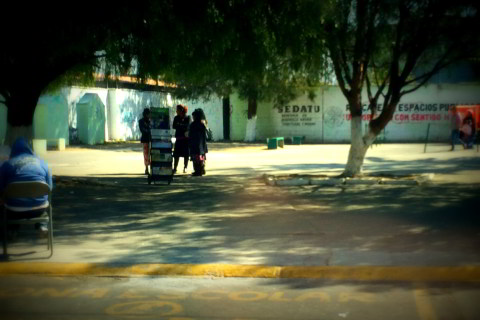Recently I was listening to a sermon series in which the speaker was talking a lot about love. Some of what he said sounded rather familiar – it was something like this:
In the Old Testament, people had to obey a lot of laws. They had to be different than the people around them. They had sacrifices and rules about food and rules about what to do about oxen.
But then Jesus came along, and changed everything. Instead of hundreds of rules, He just gave us one. “Love”.
So today, who are the people of God? They are the ones who love each other. They love their neighbours.
Today, instead of the Law, we have Love.
 Now I’ve actually heard this kind of thing quite a bit. And frankly, I think it’s a little bit of truth mixed with a whole lot of confusion.
Now I’ve actually heard this kind of thing quite a bit. And frankly, I think it’s a little bit of truth mixed with a whole lot of confusion.
Now, are Christians people who love? Well, the Apostle John would certainly say so. Take for example this little gem:
We know that we have passed out of death into life, because we love the brothers. Whoever does not love abides in death.
(1John 3:14)
Or how about the even better known:
Beloved, let us love one another, for love is from God, and whoever loves has been born of God and knows God. Anyone who does not love does not know God, because God is love.
(1John 4:7-8)
And what about all the other laws in the Bible? Well, remember this exchange between Jesus and a lawyer?
And one of them, a lawyer, asked him a question to test him. “Teacher, which is the great commandment in the Law?”
And he said to him, “You shall love the Lord your God with all your heart and with all your soul and with all your mind. This is the great and first commandment. And a second is like it: You shall love your neighbor as yourself. On these two commandments depend all the Law and the Prophets.”
(Matthew 22:35-40)
So Jesus came with something totally new, right? All we have to worry about today is “Love”. No longer is the law important. Just love.
But there’s a problem with this idea – a big one.
You can start to see it crumble when you take a look at a similar passage in Luke:
And behold, a lawyer stood up to put him to the test, saying, “Teacher, what shall I do to inherit eternal life?”
He said to him, “What is written in the Law? How do you read it?”
And he answered, “You shall love the Lord your God with all your heart and with all your soul and with all your strength and with all your mind, and your neighbor as yourself.”
And he said to him, “You have answered correctly; do this, and you will live.”
(Luke 10:25-28)
Here’s a good, educated Jewish man giving the exact same answer Jesus would give. What is written in the law? Love, of course.
Wait – isn’t love the big change? Isn’t it law vs. love?
Apparently not. The idea of loving God and loving neighbour actually comes from the law of Moses. These weren’t ideas hidden in a corner of the law – even the Jews knew (whether they practised it or not) that loving God was a major cornerstone.
“Do this” says Jesus. “Do”. Well – wait – this is law language!
Well, what about all those other laws in the Old Testament (and the New – we’ll get there in a moment)? What were they there for?
Guess what. They explained what love is.
We can’t give love any definition we want. God explains to us what love looks like – throughout the Bible.
Is this just an Old Testament thing? That love and law actually go together? Let’s go back to our favourite Apostle of Love, John himself:
Everyone who believes that Jesus is the Christ has been born of God, and everyone who loves the Father loves whoever has been born of him. By this we know that we love the children of God, when we love God and obey his commandments.
(1John 5:1-2)
You mean – we love each other by loving God and – obeying His commandments? Really? But – you mean – something specific?
Well, John does mention a few commandments in the rest of his epistle:
- Do not love the world, or the things in it (1John 2:15)
- Do not close your heart to a brother in need (1John 3:17)
- Test the spirits and beware false prophets (1John 4:1)
- Stay away from idols (1John 5:21)
John talks a lot about commandments – these are just a few examples he gives.
But wait wait – this can’t be right. Didn’t Jesus Himself set aside the law and give us love instead? Remember this…
“A new commandment I give to you, that you love one another: just as I have loved you, you also are to love one another. By this all people will know that you are my disciples, if you have love for one another.”
(John 13:34-35)
We’ve already seen that the law to love was not new. So what was new about this commandment of Jesus?
First, they were to love as Jesus loved – Jesus was giving them a new and perfect example.
Second, they were to love as disciples – Spirit-filled, redeemed, disciples.
Third, they were to be known by their love.
Love itself was not new, but it gained new meaning in a new era.
Jesus wasn’t throwing away commandments and giving us love instead. Just in the next chapter, what does Jesus say? “If you love me, you will keep my commandments.” (John 14:15)
What commandments did Jesus give? Here are a few examples…
- Do not lust (Matthew 5:28)
- Do not divorce (except in certain cases) (Matthew 5:32)
- Do not make oaths to make you “more honest” (Matthew 5:36-37)
- Do not resist an evil person (Matthew 5:39)
And on and on it goes.
Love does not replace commandments. Love is the basis of them. And love is explained in them.
Love is not contrary to the law. Love doesn’t even replace the law. Love is part of the law, a summary of the law, a fulfillment of the law (if you do it!).
One more bit of proof, and then we’ll summarize.
Check out this bold statement from the Apostle Paul:
For you were called to freedom, brothers. Only do not use your freedom as an opportunity for the flesh, but through love serve one another. For the whole law is fulfilled in one word: “You shall love your neighbor as yourself.”
(Galatians 5:13-14)
We are free from the tyranny of the law, argues Paul. Attempting to keep the law in order to be saved will result in damnation.
So does that mean we set aside the specifics, and just “love”? Or does it mean that “love” saves us?
Not at all! Love is not the Gospel, it is the way of life that we aim for once we have been saved by the Gospel.
You see, there are two ways to be saved – obey the law completely (that is, love God completely every moment of the day, love your neighbour completely every moment of the day, from birth until death – except you won’t die, because you’re perfect and therefore do not deserve death) – “do this, and you will live”, or trust in the perfect righteousness of Christ.
Remember the first verse we quoted from 1John? We know that we already have life – that we have already been saved – because we love!
A Christian loves, but that’s because they’re a Christian. Love doesn’t save anyone. Love as hard as you want – and be lost without Christ.
So then, once we’re saved, do we ignore specific commands and just “love”? Well, let’s see if Paul alludes to any commands in the rest of the chapter:
But I say, walk by the Spirit, and you will not gratify the desires of the flesh. For the desires of the flesh are against the Spirit, and the desires of the Spirit are against the flesh, for these are opposed to each other, to keep you from doing the things you want to do. But if you are led by the Spirit, you are not under the law.
Now the works of the flesh are evident: sexual immorality, impurity, sensuality, idolatry, sorcery, enmity, strife, jealousy, fits of anger, rivalries, dissensions, divisions, envy, drunkenness, orgies, and things like these. I warn you, as I warned you before, that those who do such things will not inherit the kingdom of God.
But the fruit of the Spirit is love, joy, peace, patience, kindness, goodness, faithfulness, gentleness, self-control; against such things there is no law.
(Galatians 5:16-23)
Yeah, he mentioned one or two things. Pretty specific things.
What’s the difference? Why are we not “under the law”?
Well, we’re free from it because we are already perfect in Christ. We’re free from putting on an “external show” of our “righteousness”. We’re empowered to obey God by the Spirit. It’s all the difference in the world.
In summary (and why this is so important!):
- Love does not replace law – it is the law. That means that loving God and loving your neighbour will never save you. It will never make you righteous before God. We love because we are saved, we’re not saved because we love. If we ask people to completely define themselves by love, we’re putting the burden of the law back on them (Acts 15:10)!
- Love does not replace the law, it fulfills the law. The law explains what love is. A lot of people seem to want to lift “love” out of the Bible and make it mean whatever they want. Love interpreted by psychology. Love explained by modern culture. Love through the filter of how I feel today. How about – love defined by the One who is love? Love points to the Bible, it doesn’t make it irrelevant (Romans 13:7-10).
The command to love is perhaps the best way to demonstrate how lost and sinful we are. We have disobeyed the greatest commandments – repeatedly. Everyone knows love is a good thing – but no one lives it every day.
And so love points us to Jesus – who loved perfectly – and died because of His love for the Father and for us. And He freed us from the law.
As believers in Christ, we are given His perfect righteousness. And He changes us. His Spirit empowers us to love. Not in order to meet some standard of external obedience. Not to reach God with our own goodness. But to express a joyful, free, giving love from the heart.
It’s not law vs. love. We are free from its burden – and so free to really learn to love and obey in all the power and grace of God.
The grace of the Lord Jesus Christ and the love of God and the fellowship of the Holy Spirit be with you all. (2Corinthians 13:14)

 For example, I’ve been preparing for tomorrow’s Sunday School class. I’ve been meditating on the value of getting a laser-focus in on Christ as we study the Scripture.
For example, I’ve been preparing for tomorrow’s Sunday School class. I’ve been meditating on the value of getting a laser-focus in on Christ as we study the Scripture.
 Who knows what the motto of our cultural centre is?
Who knows what the motto of our cultural centre is? Now I’ve actually heard this kind of thing quite a bit. And frankly, I think it’s a little bit of truth mixed with a whole lot of confusion.
Now I’ve actually heard this kind of thing quite a bit. And frankly, I think it’s a little bit of truth mixed with a whole lot of confusion.